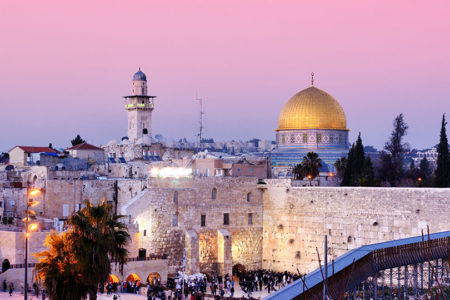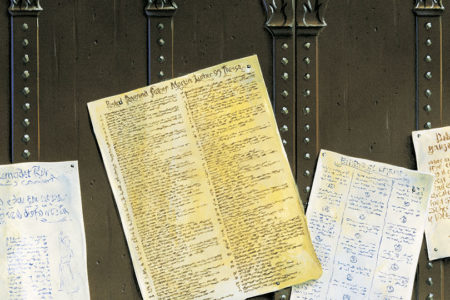Lost Hope Reclaimed
Then he said unto me, Son of man, these bones are the whole house of Israel; behold, they say, Our bones are dried, and our hope is lost; we are cut off on our part (Ezek. 37:11).
The name Ezekiel means “God will strengthen.” As he stood staring into a valley strewn with scattered, dry, sun-scorched bones, Ezekiel certainly needed a large infusion of God’s strength. The heart-wrenching lament the prophet-priest heard made him realize that his people had lost all hope.
As Ezekiel prophesied to his captive people, an unnamed compatriot and psalmist poetically described the emotions of the Jewish exiles in Babylon:
By the rivers of Babylon, there we sat down, yea, we wept, when we remembered Zion. We hung our harps upon the willows in the midst thereof. …Howshallwesingthe LORD’S song in a foreign land? (Ps. 137:1–2, 4).
In his commentary on this psalm, the late Bible expositor J. Vernon McGee captured the plight of the Jewish people. Dr. McGee wrote,
These people have had an experience that no other people have had. From the land of Goshen to the ghettos of Europe they have known what it is to be away from their homeland, to be in a strange land. They know what it is to go all the way from the brickyards of Egypt to Babylonian canals. They know what it is to spend time in slave labor camps. By the rivers of Babylon was a place where they were persecuted, where they performed slave labor, a place they suffered.1
McGee continued: “With a sob in their soul they said, ‘We’ve lost our song.’” This condition, as debilitating and frightening as lost breath, hovered like a cloud over the Jewish people well beyond the rivers of Babylon. Jewish history abounds with accounts of persecution, torture, and expulsion from lands the Jewish people had tried in vain to call home. For more than two thousand years, they wandered the earth—the unfortunate, often unwelcome guests in various Gentile lands. Could their lost hope ever be regained?
As the nineteenth century drew to a close, things were taking place that indicated the dead bones in Ezekiel’s ancient vision were beginning to shake, just as he had been told they would (37:2–7). Those noisy, moving, yet lifeless bones were the various gifted Jewish people—still separated by space, age, and time—who were following an almost mysterious call to unite the people without a land to the land without a people.
Men like Theodor Herzl, Eliezer Ben-Yehuda, David Ben-Gurion, and Chaim Weitzman were among the many who championed the remedy for lost Jewish hope— Zionism, the movement for a national Jewish homeland in Eretz Yisrael, the land God had promised as an everlasting possession to the descendants of Abraham, Isaac, and Jacob. With an almost spiritual fervor, they provided the energy needed to bring the bones together.
One such champion wrote a poem that Jewish people around the world would memorize and even sing. Originally titled Tkvatenu (Our Hope), it later was renamed Ha-tikvah (The Hope). It was written around 1878 by Romanian Naphtali Hetrz Imber, published in 1886, and eventually set to music. Somehow, the singing of Ha-tikvah infused an energy and enthusiasm into the dry, parched, and scattered bones of Ezekiel’s 2,500-year-old vision, gathering them into a great and standing army. Ha-tikvah became a rallying song and, eventually, the national anthem of the resurrected, modern State of Israel.
Born in 1856, Naphtali Hetrz Imber was considered a child prodigy, excelling in Hebraic and Talmudic studies. He began writing poetry at age ten. His great abilities in Jewish studies provided opportunities for him to travel to such places as Paris, Berlin, London, Bombay, Palestine, and even New York. His visits to these faraway cities of the world inspired him to write many of his essays, prose, and poems.
From 1882 to 1886, Imber served as secretary and adviser on Jewish affairs in Palestine under Christian-Zionist Laurence Oliphant.2 He immediately fell in love with the place, rock-strewn and barren though it was at that time. The experience so changed him that he devoted the rest of his life to enabling his people to return to Eretz Yisrael (the land of Israel).
At the same time, this same yearning seized thousands of Jews around the world. Many left countries they were living in to make the difficult and dangerous journey home. As Imber traveled the countryside visiting the various Jewish colonies and communities, he often stopped to read his poem to these pioneers and settlers. The words of Ha-tikvah moved them immensely, encouraging them to continue their struggle to secure their homeland. Imber added several stanzas to his work, inspired by the reception it had when he read it. Many of these farming communities already had adopted a poem or song for the very purpose of uniting and encouraging them in their cause. One such community, Rehovot, established in 1890, chose Ha-tikvah as its anthem.
The origins of the haunting music attached to the poem are somewhat of a mystery. Some say it can be traced to “The Bohemian Symphony” by Czech composer Smetana—strains of the melody can be heard throughout the work. Others say it is based on the Sephardic melody for Psalm 117 in the Hallel service.3 Or perhaps the composer was Samuel Cohen, a Moldavian immigrant and resident of Rehovot who used a Romanian tune. No one seems to know for sure.
In 1897 the first Zionist Congress met in Basel, Switzerland. There delegates determined that a national anthem would be needed for the future Zionist state. Theodor Herzl and Max Nordau decided to hold a competition to find a suitable one. The entries reportedly were so bad that Herzl ordered the contest canceled and the entries destroyed.
The next year, in 1898, Herzl visited the Jewish community of Rehovot and heard the singing of Ha-tikvah. He was so impressed with the song that he had it performed at the 1901 Zionist Congress in Romania. Informally adopted as the official song of the Congress in 1905, it caught on quickly and soon became a song of the people throughout the land of Palestine. In 1933 the Zionist Congress met and confirmed Hatikvah as the official anthem of the Zionist movement.
Soon the song’s melodious strains could be heard throughout the land, stirring so much emotion and passion among the Palestinian Jews that the British who controlled the land banned it. As a result of that action, the forbidden song became a rallying call for an underground movement throughout the country. When Israel declared its statehood in 1948, it was sung as the national anthem. Except for a bill tabled by the Knesset in 1967 that would have made the song “Jerusalem of Gold” the anthem, Ha-tikvah has never been challenged and remains the national anthem of Israel today. It is an interesting reflection on Israel’s history and population in that it was written, not by a Hebrew-speaking Sabra (native born Israeli), but by a Romanian-speaking member of the Diaspora (scattered Jews) who, himself, possessed that great hope for a homeland.
There are those who believe that Ha-tikvah should not be the anthem because, like America’s “Star Spangled Banner,” it is difficult to play and sing. Yet worldrenowned musician Zubin Mehta, former conductor of the Israel Symphony, has called it the most beautiful anthem on earth.
An almost indescribable feeling comes over most Jews today when Ha-tikvah is sung. Somehow the lyrics possess the power to restore the hope so many Jewish people have lost through thousands of years of tragic history.
The poem says, “The hope of two thousand years, to be free, A free people in our land, Our hope is not lost.” Ha-tikva is an anthem able to unite the Jewish political and/or religious right with the Jewish political and/or religious left. For more than one hundred years, Ha-tikvah has been reclaiming hope for the Jewish people.
Imber, who died in 1908, had written Ha-tikvah when there was no Israel and there were no Israelis. The overwhelming majority of the Jewish population had been dispossessed for almost two thousand years. The only Hebrew spoken was in synagogues on the Sabbath or some other feast day. Today every Jewish person in the world is entitled to citizenship in this land given to their father Abraham—a land where Hebrew is spoken in homes, on streets, and in the seat of government as well as in synagogues.
What power could accomplish that monumental feat? The answer is found in the heart of the 37th chapter of Ezekiel, verse 12:
I will open your graves, and cause you to come up out of your graves, and bring you into the land of Israel.
As wonderful as it may be that Jewish people today can stand proudly before the flag of Israel and sing Ha-tikvah, a future day will bring something far more glorious. In Ezekiel 37:14 God says,
And [I] shall put my Spirit in you, and ye shall live, and I shall place you in your own land; then shall ye know that I, the LORD, have spoken it, and performed it, saith the LORD.






